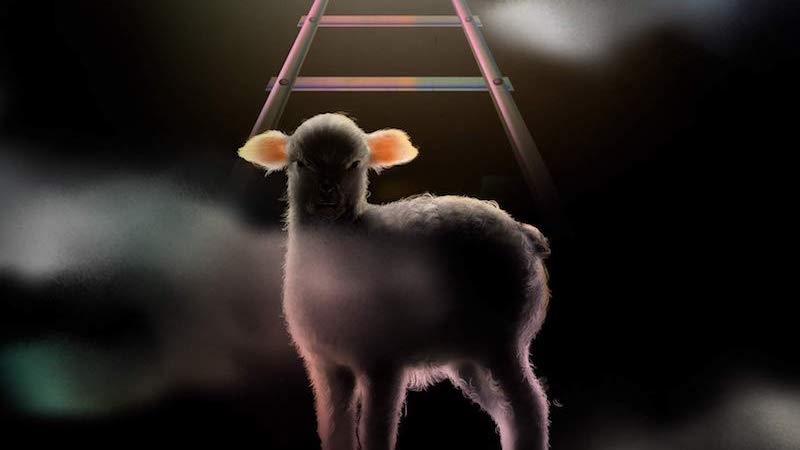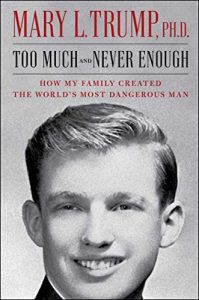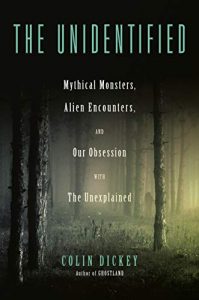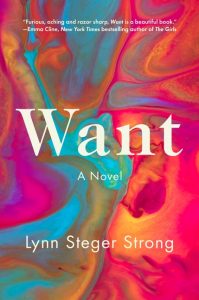
This week’s Fantastic Five includes Jennifer Szalai on Mary L. Trump’s Too Much and Never Enough, Andrea Long Chu on Curtis Sittenfeld’s Rodham, Dwight Garner on Kelli Jo Ford’s Crooked Hallelujah, Josephine Livingstone on Colin Dickey’s The Unidentified, and Hillary Kelly on Lynn Steger Strong’s Want.
*

“…will the real world survive Donald Trump? Mary says that American democracy will not if he gets a second term. The story she describes in Too Much and Never Enough is presented as a cautionary tale. Donald, she says, can’t help recreating a familial psychodrama that destroyed everyone it touched. She recalls waking up at 5 a.m. the morning after the 2016 election: ‘It felt as though 62,979,636 voters had chosen to turn this country into a macro version of my malignantly dysfunctional family’ … Donald…thrived in the world that his father created, even if, as Mary argues, his personality was ultimately deformed by the experience. The psychologist in her is sympathetic. She says her uncle has the emotional maturity of a 3-year-old and has ‘suffered mightily,’ burdened by what she calls an insatiable ‘black hole of need.’ He was trained to hunger endlessly for daddy’s approval; it’s just that now, as president of the United States, she says, the figures who remind him of home are Vladimir Putin and Kim Jong-un … This is a book that’s been written from pain and is designed to hurt. Recalling her decision to share financial documents with a team of New York Times reporters who would write a 14,000-word article on the Trumps’ tax schemes in 2018, Mary describes feeling so damaged by her grandfather’s cruelty ‘that only a grand gesture would set it right.’ Forget the psychologist’s vocabulary of childhood attachment and personality disorders; it’s when Mary talks about her need ‘to take Donald down’ that she starts speaking the only language her family truly understands.”
–Jennifer Szalai on Mary L. Trump’s Too Much and Never Enough: How My Family Created the World’s Most Dangerous Man (The New York Times)

“…there is no fiery car crash in Rodham, nor does its eponymous heroine move to Maine, get a dog, and solve a string of opioid-related murders. This is a shame; if an author is just going to make things up, they might as well be interesting. Instead, the novel obeys what we might call the caterpillar effect: the principle that an apparently major change in the initial conditions of a complex system may, many iterations later, make almost no difference at all … To call this speculative fiction would be an insult to that fine genre…it imagines the world not differently but rather, with smug admiration for its subject, exactly as it always was. The resulting book is nothing but a large commemorative stamp, dependent wholly in use and function on the reader’s willingness to lick it … Much has already been made of the graphic sex scenes in Rodham, which invite readers to imagine, among other things…But this is not juice; it is sugar in water. Such scenes represent only the affectation of candor, carefully calculated to bamboozle reviewers into admitting that the author, like Bill Clinton’s penis, has adequately plumbed her subject’s depths … This is, against all odds, the book’s single insight into Hillary Clinton: She knew nothing of power except that she wanted it. The author, insofar as she senses this, is fine with it. Sittenfeld’s Hillary never promotes her husband’s crime bill or votes for the Iraq War—she is conveniently spared the opportunity—but the one thing you must understand about this book is that it was written by and for someone who doesn’t care that the real Hillary did.”
–Andrea Long Chu on Curtis Sittenfeld’s Rodham (Jewish Currents)
“… more than promising … Kelli Jo Ford summons the details of minimum-wage life in the last quarter of the 20th century. She does this without cluttering her spare sentences, which is why her details resonate … This is a novel in stories, a dread form in the wrong hands. The point of view shifts, vertiginously, from one chapter to the next, as if you are watching a heist from multiple security cameras. But Crooked Hallelujah has a supple cohesiveness … As a writer, Ford is quietist. Her book reads like a series of acoustic songs recorded on a single microphone in a bare room with a carpet. There are times when you might wish for more boldness, but she never puts a wrong foot. This is a writer who carefully husbands her resources. Small scenes begin to glitter … has an elegiac rather than a comic tone. Yet when I combed back through my notes, I realized that so many moments had made me smile … Ford’s novel finds its center of gravity at the intimate human level.”
–Dwight Garner on Kelli Jo Ford’s Crooked Hallelujah (The New York Times)

“As coronavirus-related misinformation continues to spread across America (special notice must go to the woman in Arizona who destroyed a mask display at a Target last week), Colin Dickey’s new book about the rise of conspiracy theories and paranoid thought in American culture, could not come at a better time … To be a truly American paranoid belief, in Dickey’s book, there must be a distinctly credible witness involved; an event which defies scientific logic; some aspect of the bodily horrible or uncanny; and a writer on hand to edit the facts into a story ready to hit the big time … The American paranormal is as much a product of narrative, therefore, as events themselves. The transmission of a paranormal event can come via any medium, be it Breitbart or TV show or oral tradition. This parallel narrative history is the factor that distinguishes a true conspiracy from a mere daydream … Dickey locates America’s fear of aliens—a fantasy or a nightmare of our future selves, bodies withered and heads enlarged by our reliance on technology—in first the Cold War and then the fall of the Soviet Union. Losing its traditional enemy set America’s paranoia adrift. Americans still felt haunted but had no enemy to blame except their own authorities. And so they turned inward, exchanging the ‘Rosenberg spies and Manchurian candidates’ for extraterrestrials and their Deep State conspirators … As popular histories go, The Unidentified is unusually terrifying, like one long gesture at an unspeakable truth Dickey is unable to express directly: the paranoid crisis afflicting American culture is exactly as bad as it seems.”
–Josephine Livingstone on Colin Dickey’s The Unidentified (The New Republic)

“… a defining novel of our age of left-behind families … By the time of its publication this July, four months into unemployment numbers so obscene that they’ll be meaningless, Want doesn’t feel so far off from the lives many Americans have been living every day … Want’s narrator is white, a creative, Brooklyn-based: the three horsemen of our decade’s literary apocalypse, in which an obnoxious percentage of literary fiction dotes on characters you couldn’t tell apart in a Carroll Gardens precinct line-up. Elizabeth knows exactly where she hovers on the food chain of people with hard lives. She comes from money, though her father says that a loan of any kind ‘would be like throwing it away.’ Want spiritually strides away from its western Brooklyn kin as quickly as possible …. an ideal sample of how to produce fiction that is timely and timeless … This is a new middle class, not actually a middle class at all, but a static hell of depleted expectations and small indecencies, as if Anne Helen Petersen’s viral burnout article and John Steinbeck’s oeuvre had a baby … It’s appeal right now may have something to do with the ways it thoughtfully plays with autofiction, darting in with details from Strong’s real life, then knowingly inflating and reshaping plot points, a wise reimagining of what we can do with our own stories … But it’s also due to the prose—liquid, tender, fluttering—which keeps this story easy, perhaps too easy, to read. It’s an odd pleasure—a difficult story that is winningly told. You’ll feel guilty for enjoying it as much as you do.”
–Hillary Kelly on Lynn Steger Strong’s Want (Vulture)

